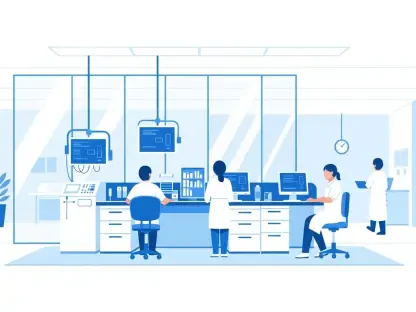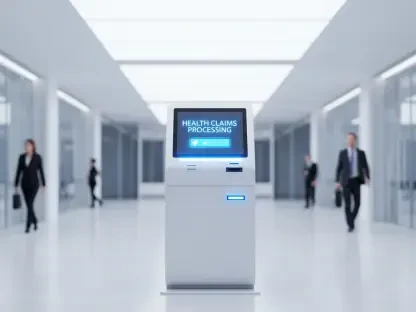In a bustling urban hospital, a patient with severe abdominal pain waits months for a gastroenterology consultation, only to face further delays for a critical procedure, highlighting a stark reflection of a growing crisis in specialty care across the United States. With physician shortages mounting and patient demand soaring, access to timely, expert care has become a luxury for many. The strain on the system raises a pressing question: how can healthcare evolve to meet these urgent needs without compromising safety or quality?
The significance of this challenge cannot be overstated. As millions grapple with delayed diagnoses and worsening conditions, the integration of Advanced Practice Providers (APPs), supported by physicians (MDs) and artificial intelligence (AI), emerges as a potential lifeline. This approach promises not only to expand capacity but also to redefine how specialty care operates in high-stakes fields like gastroenterology. Exploring this innovative model reveals a pathway to bridge the gap between overwhelming demand and limited resources, ensuring patients receive the care they deserve.
Unpacking the Crisis: Why Specialty Care Falls Short
The shortage of specialists has reached a critical point, leaving patients stranded in a system that cannot keep pace. In specialties such as gastroenterology, wait times for appointments often stretch into months, with some regions reporting delays of over 90 days for initial consultations. These bottlenecks translate into real human costs—missed diagnoses, untreated conditions, and deteriorating health outcomes for those who cannot afford to wait.
Beyond the numbers, the emotional toll is profound. Consider a middle-aged individual with persistent digestive issues, unable to secure a timely endoscopy due to a lack of available specialists. The anxiety of uncertainty, coupled with worsening symptoms, underscores a systemic failure that extends far beyond scheduling inconveniences. Such stories highlight the urgent need for solutions that address both access and efficiency.
This crisis is not merely a matter of supply and demand but a signal that traditional models of care are no longer sustainable. With an aging population and rising chronic disease rates, the pressure on specialists continues to intensify. Finding a way forward requires rethinking who delivers care and how, setting the stage for a collaborative framework that leverages diverse expertise and cutting-edge tools.
Systemic Flaws: How Outdated Structures Hinder Progress
At the heart of the specialty care crisis lies a deeper issue: legacy healthcare systems designed exclusively for physician-led models. These frameworks struggle to accommodate the growing role of APPs, such as nurse practitioners and physician assistants, who are increasingly tasked with filling provider gaps. Without updated workflows, their integration often feels like a patchwork solution, lacking the structure needed to ensure consistent quality.
Reports from investigative sources reveal troubling trends, including instances where inadequate training or oversight for APPs has led to errors in complex cases. This is not a reflection on the capabilities of APPs but rather on the absence of robust clinical architectures to support their expanded roles. The mismatch between current systems and evolving needs creates risks that erode trust among patients and providers alike.
Addressing these shortcomings demands a shift in perspective. Rather than viewing APPs as mere substitutes for physicians, healthcare must prioritize designing environments where their skills are maximized through clear guidelines and reliable supervision. This systemic overhaul is essential to safeguard patient safety while meeting the escalating demands of specialty care.
Crafting a Collaborative Future: Roles of APPs, MDs, and AI
A reimagined model for specialty care hinges on three interlocking components: APPs as frontline providers, MDs as strategic overseers, and AI as a real-time support system. APPs can significantly alleviate access issues by managing routine cases, such as initial screenings in gastroenterology, freeing up specialists for more intricate procedures. Studies indicate that APPs, when properly trained, achieve comparable outcomes to physicians in standardized scenarios, enhancing system capacity.
Physicians, in turn, play a pivotal role as supervisors, stepping in for complex or atypical cases where their expertise is indispensable. Structured oversight models have shown promising results, with data suggesting a 20% reduction in adverse events when APPs operate under defined physician guidance. This collaborative dynamic ensures that patient care remains both scalable and secure, balancing efficiency with precision.
AI introduces a transformative layer by offering real-time monitoring and decision support. Imagine a scenario where an AI tool flags a subtle anomaly in a patient’s chart during an APP-led consultation, prompting immediate physician review. Such technology not only enhances safety by catching potential oversights but also streamlines workflows by prioritizing where human expertise is most needed. Together, these elements form a cohesive system poised to redefine specialty care delivery.
On the Front Lines: Perspectives from Healthcare Innovators
Insights from those directly involved in care redesign add depth to the conversation around APP integration. Russ Arjal, MD, AGAF, a practicing gastroenterologist and thought leader, emphasizes the necessity of systemic change over quick fixes. “Specialty care cannot thrive on improvisation,” he notes. “Structured protocols and real-time support are critical to empowering APPs while protecting patients.”
Balancing this perspective are critiques from broader investigations, which point to historical gaps in APP oversight as a source of concern. Yet, testimonials from APPs working within well-designed collaborative models paint a different picture. One nurse practitioner in a gastroenterology clinic shared how AI-assisted monitoring and clear escalation pathways allowed confident handling of routine cases, knowing physician backup was readily accessible. Such experiences underscore the potential of intentional system design.
These diverse voices collectively highlight a shared truth: success in specialty care redesign depends on collaboration and accountability. By addressing oversight challenges and fostering environments where APPs and MDs complement each other, supported by technology, the field can move toward a more reliable and inclusive care model. This convergence of expertise offers a glimpse into what is possible when innovation meets practical implementation.
A Roadmap for Change: Implementing a New Care Framework
Transforming specialty care requires actionable steps tailored to its unique demands. First, developing specialty-specific clinical protocols is essential to standardize APP practice, ensuring consistency in handling common conditions like routine colonoscopies. These guidelines must be rooted in evidence and regularly updated to reflect best practices, providing a clear foundation for care delivery.
Next, establishing real-time escalation pathways ensures seamless physician involvement in complex cases. Health systems should design workflows where APPs can instantly consult MDs for guidance, minimizing delays and risks. Additionally, integrating AI tools for monitoring adherence and offering feedback is crucial. Selecting platforms that prioritize safety, such as those with proven accuracy in detecting clinical deviations, can enhance trust and efficiency.
Finally, continuous training and peer collaboration networks are vital to reduce variability and support professional growth. Regular workshops and shared learning forums can equip APPs with evolving skills while fostering a culture of mutual support among providers. This comprehensive framework offers health systems a practical guide to rebuild specialty care, ensuring it meets patient needs without sacrificing quality or safety.
Looking back, the journey to redesign specialty care has revealed both the depth of the crisis and the promise of innovation. Reflecting on the strides made through integrating APPs, MDs, and AI, it becomes clear that collaboration is the cornerstone of progress. The path forward demands a commitment to systemic change, prioritizing structured support over hasty solutions. Health systems are encouraged to invest in protocols, technology, and training as enduring pillars of a safer, more accessible model. As the field continues to evolve, the focus remains on empowering providers and protecting patients, ensuring that no one is left waiting in the face of urgent need.









